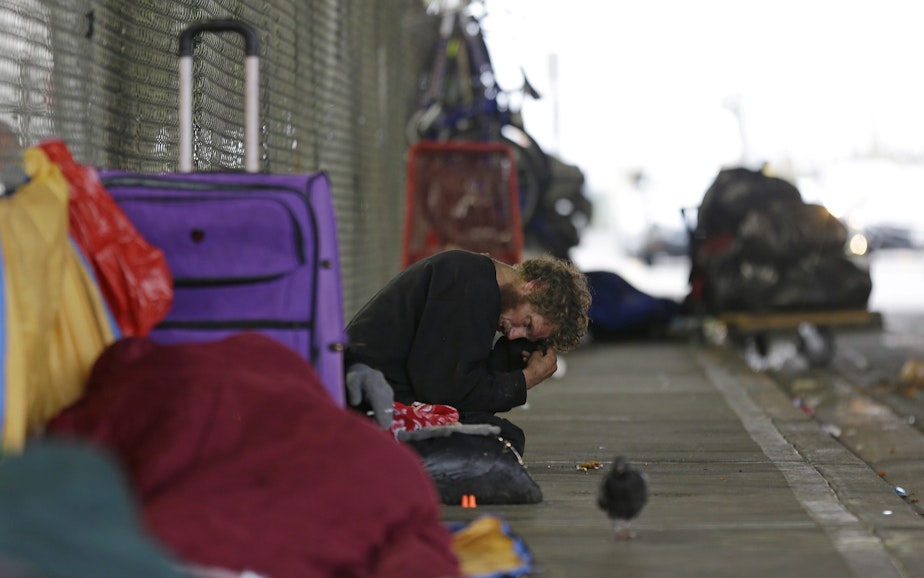Seattle suburbs crack down on homeless camping with fines and jail time

Homelessness has become more visible in Seattle suburbs during the pandemic, and these cities have rushed in recent weeks to pass public camping bans. Many of these new ordinances come with jail time.
City council members say the bans are needed to address the region’s growing homelessness crisis, and that outreach is prioritized over enforcement. But advocates for the unhoused say the ordinances criminalize homelessness and move unsheltered people into Seattle.
Mercer Island: Police to drive unhoused people to nearby cities
In February, the Mercer Island City Council voted to prohibit people from camping in parks, public places, and in cars or RVs on public roads.
Mercer Island already had a public camping ban, but the City Council says a recent rise in homelessness called for a new ordinance. Because Mercer Island does not have homeless shelters, police will transport people experiencing homelessness off the affluent island to shelters in neighboring Kirkland and Bellevue.
Sponsored
Congregations For The Homeless in Bellevue is the closest shelter to Mercer Island, mostly serving single men. Executive Director David Bowling told KUOW in February that the shelter had not been contacted by the city of Mercer Island or its police department about unsheltered people potentially being transported to their shelter.
“You can drop people off, but since we have a waiting list of 5 to 10 people every night looking for shelter who do not get in, your individuals you drop off are not going to get a bed,” Bowling said.
Auburn: Possible jail time for sleeping in public if shelter available
Last month, the Auburn City Council made it a criminal penalty to sleep on public property if shelter is available.
Last year, the City Council had reduced the penalty for camping in public to a civil infraction with up to a $250 fine, down from a criminal offense. This new ordinance raises the fine to $1,000 and could include 90 days in jail.
Sponsored
During the council vote in April, council members described the penalty as a last resort that would rarely be used in cases of unsheltered people completely resistant to shelter options offered.
Everett: Pallet shelters, fine and jail for sleeping on Smith Avenue
The Everett City Council passed an ordinance in March prohibiting people from sitting or lying down on a 10-block stretch of an industrial road in the city.
The Council said the “no sit, no lie” ordinance on Smith Avenue won’t go into effect until the city builds 20 temporary pallet shelters behind the nearby Gospel Mission.
Julie Willie, Everett’s community development director, said in a promotional video last week that the one-year pilot program is necessary as non-sanctioned encampments cost Everett “a lot of money to clean up,” and the city’s emergency response system is “overly utilized by individuals on the street who often suffer from a combination of medical, behavioral, and substance use challenges.”
Sponsored
John Hull, director of strategic initiatives at the Gospel Mission, said there is a great need for more shelters in the area: He said the mission is the only shelter that serves single men in Snohomish County.
The pallet shelters should be available this summer; after that people sleeping on Smith Avenue could face a $500 fine and 90 days in jail.
Tacoma: Camping ban to be modified
The Tacoma City Council is considering a ban on public camping. Last month the council was set to vote on prohibiting people from camping or storing personal belongings on public property. Councilmember Robert Thoms tabled the ordinance for 30 days to add updates.
Tacoma originally banned public camping in 2017, but that legislation expired in 2019. Now, Thoms says with more visible homelessness in Tacoma parks, the Council should renew the ban, which would carry a $1,000 fine and potentially 90 days in jail.
Sponsored
The Tacoma Pierce County Coalition to End Homelessness has said they reject this ban, which could face a vote as early as next week.
“It is my hope to make some modest changes to that based on support from the coalition and bring it back before the council,” Thoms said.




